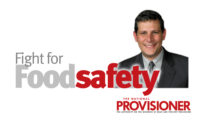Tyson Helps Power Retail Delis
Tyson Helps Power Retail Delis
For more than 15 years, the Deli Division of Tyson Foods has delivered products and business solutions that are developed with the retail deli in mind. Tyson understands the need for higher margins, reduced shrink and better service with less labor, all the while providing a quality product that consumers will buy. The consumer is king, Tyson believes, and Tyson has the experience and knowledge to help delis innovate and better meet consumers’ meal needs.
“As a leader in the food industry, we win when our customers win,” states Lori Simco, V.P. of Marketing for the Tyson Deli Division. “This can only occur when the consumer is satisfied with their overall experience both with the product and the shopping experience.”
To make winners of its customers, Tyson Deli Division aims to increase consumer usage occasions for the deli and to increase overall velocity. Consumers already give credibility to the deli for its ability to provide freshly prepared meal solutions, but a take-out trend has developed in the deli in recent years. Technomic, a food industry and consulting firm, estimates that take-out sales from full-service restaurants accounted for nearly 10 percent of the category’s total sales volume, and take-out sales have grown about 9 percent annually over the past three years — about twice the rate of overall sales growth.
“Without cannibalizing regular dinner sales, take-out at full-service restaurants is tapping into customers who would normally eat elsewhere,” Simco says. “In fact, about 90 percent of take-out customers would not have eaten in the restaurant otherwise, opting instead for eating at home or purchasing fast food. Therefore, restaurant chains all across the country are increasing their focus on take-out, and understandably so.”
As the world’s largest protein supplier and a dominant brand in Retail and Food Service, Tyson helps retailers capitalize on the take-out meal occasion, developing branded solutions that help retailers drive profitability. Its cross-functional and focused sales, marketing, customer service and operations team brings foodservice and retail insights to bear on its retail partners’ business in order to deliver brands, products and business solutions that solve consumers’ meal needs and drive retail sales.
Tysons empowerment strategy
Tyson deli’s strategy will be to Power its retail delis, through its commitment to:
Actionable consumer insights
Brands that drive purchase and loyalty
Unmatched product portfolio
Excellence in service and quality
Business solutions targeted at driving sales
Actionable consumer insights
Brands that drive purchase and loyalty
Unmatched product portfolio
Excellence in service and quality
Business solutions targeted at driving sales
Actionable consumer insights
When Tyson Foods partnered with noted futurist Faith Popcorn, its goal was to better understand American consumer trends. Tyson wanted to know where the American consumer would be in 10-15 years, what the most effective way was to understand consumers and how to connect with consumers on a deeper more emotional level.
Through the partnership, Tyson Foods identified seven distinct consumer segments:
Labor of Love
Pragmatist
Fun Loving Foodie
Dissatisfied Diner
Out & About Eater
Culinary Chaotic
Labor of Love
Pragmatist
Fun Loving Foodie
Dissatisfied Diner
Out & About Eater
Culinary Chaotic
All About Me
These segments group consumers based on their attitudes around food rather than standard demographics. The seven segments allow Tyson to better predict shopping behavior and target products to meet consumers’ needs not only on a functional level, but also on an emotional level.
For example, the Labor of Love consumer is highly risk-averse when it comes to deli products. Labor of Loves want to be sure that the product they are buying will be safe to feed their family — as a result they use brands as a guidepost to value and quality. If Labor of Loves are a core target of a retailer’s deli, the deli will need to merchandise key brands, communicate quality cues to their consumer, and know that family is top of mind in every purchase.
Fun Loving Foodies, on the other hand, are impulse shoppers easily influenced to make an unplanned purchase when they enter the store. Recognizing the size of this group and their shopping habits represents an untapped financial opportunity for supermarket retailers.
Overall, using Tyson’s Consumer Insights knowledge enables the retailer to target high-value consumer segments in the deli and has the potential to unlock very significant financial benefits.
Understanding the distinct consumer segments and predicting their behavior also permits a retailer to communicate effectively with their consumers. That is why Tyson’s Deli Division dives into the consumer segments in every quantitative and qualitative research project — to provide targeted insights into shopper behavior and predict their future actions.
Brands that drive purchase and loyalty
Brands offer an opportunity for retailers to move the consumer decision tree from a predominantly price-focused tree to one that is focused on quality.
“Consolidation in the food retailing industry has driven supermarket retailers to re-examine their business strategies around branding,” says Eric Le Blanc, Tyson Deli Director of Marketing. “Differentiation by product selection or price in center-of-store is difficult, and margin pressures across the store are brutal.”
Given the strategic importance that the perishables departments drive traffic, build consumer loyalty and gain margin outside of center-store, it becomes clear that there are three criteria for choosing when to activate a brand: (1) The brand increases velocity, (2) the brand decreases price sensitivity, and (3) the brand increases consumer confidence in the quality of the product.
“What discipline will we use in assessing a brand’s performance against these criteria?” Le Blanc asks. “The only sound basis for making this assessment is consumer-validated research and real-world trial.”
Tyson deli has the research and the real-world trials, and as a result Tyson deli is bringing the value of the “Powered by Tyson” brand to deli-prepared foods, but also delivering uniquely positioned deli meat brands such as Russer®, Wilson™, and Wunderbar®.
Although Tyson Foods has been an important supplier in the prepared-foods segment of supermarket delis for years, it had not traditionally sought to brand its product to the consumer. There had never been a doubt about the strength of the Tyson brand in other grocery departments, consistently ranking with the strongest retail food brands and having nearly universal recognition for its chicken products. Yet, as the company considered how it might help retailers achieve greater sales results in the deli, especially as some of Tyson’s key categories, such as rotisserie chicken, matured there, it became imperative that Tyson know more about consumer perception of the Tyson brand in the deli.
In 2006, the Tyson Deli Division began extensive qualitative and quantitative research of the Powered by Tyson brand on prepared foods and discovered deli consumers connect with the Tyson brand, the Tyson brand powers purchase frequency, and Tyson powers consumer confidence.
98% of shoppers surveyed expressed that they “like the Tyson Brand”
96% indicate that they feel safer because they know the source of the chicken
Deli shoppers indicate they would increase the frequency with which they purchase deli-prepared foods by 24% if it were endorsed by the Tyson brand
72% of deli shoppers indicate they have higher con fidence in the quality of the product if it is endorsed by the Tyson brand
98% of shoppers surveyed expressed that they “like the Tyson Brand”
96% indicate that they feel safer because they know the source of the chicken
Deli shoppers indicate they would increase the frequency with which they purchase deli-prepared foods by 24% if it were endorsed by the Tyson brand
72% of deli shoppers indicate they have higher con fidence in the quality of the product if it is endorsed by the Tyson brand
Tyson profile, continued:
As a result, Tyson Deli Division developed branded programs around rotisserie chicken and a new rotisserie pork loin product.
Also in 2006, the Tyson Deli Division invested in revitalizing the Russer® deli meat brand to better deliver on retailer and consumers needs. Tyson recognized that retailers were faced with a declining service-deli meat volume (down 9% over the past two years1) and self-serve volume (down 20% over the last two years2). At the same time, retailers looking for a solution turned their deli over to ultra-premium offerings at $8.99 or $10.99 per pound. This may have increased sales, but it also decreased unit volume and alienated some consumers looking for more affordable solutions.
Tyson recognized the need for a uniquely positioned brand that could drive volume while still offering a premium product at an affordable price. Consumer research into the deli-meat category revealed that Russer® could deliver on this need and complement delis’ ultra-premium programs (supplier or own brands).
Tyson updated the Russer® logo, packaging, and marketing communications to deliver on the premium product messaging. Today Russer® remains a traditional, deli-only brand, using authentic New York deli-meat recipes and only the highest-quality and freshest ingredients in order to ensure a quality brand message to consumers. Russer® fits the needs of heavy deli users for a high quality product at a valued price.
Unmatched Product Portfolio
Tyson has the ability to service approximately two-thirds of a retail deli’s product assortment and positions the Tyson Deli Division to be true category partners. Tyson deli offers an array of products in the deli meats, chicken, tortilla, prepared side items and pizza categories. In addition, Tyson offers a selection of chef-developed, handcrafted upscale entrees, such as Prosciutto Wrapped Smoked Gouda Chicken Breast or Brandy Apple Stuffed Pork Chop.
Tyson’s Deli Division is committed to product innovation and has a dedicated staff of product management, research development, and chefs focused on driving new product development in the deli channel. In early 2007, Tyson Foods will open the “Discovery Center,” a state-of-the-art research-and-development facility that will increase the speed and efficiency of new product development.
Excellence in service and quality
Tyson Foods has approximately 114,000 team members employed at more than 300 facilities and offices in the United States and around the world. Tyson strives to operate more efficiently and maintain the best cost-management practices and is committed to delivering safe, quality products. Ongoing improvement programs make processing plants and products safer, increase efficiencies, improve yields, improve team member safety and control operating costs.
Tyson’s world-class network includes nearly 3,000 team members in 62 food-safety and quality-assurance (FSQA) plant locations as well as 18 FSQA corporate and regional laboratories. Tyson FSQA performs product inspections at key points in production and executes daily product cuttings at plants to review product quality. Tyson utilizes a Hazard Analysis and Critical Control Point (HACCP) approach, laboratory certification, internal food-safety audits, independent inspection, and training programs to ensure quality products for retailers and consumers.
Tyson implements strict product specifications and labeling requirements that go above and beyond that of government regulations and standards. In addition to the FSQA, Tyson implements extensive team member training, company-wide feedback forums to solicit input from team members on cost control/improvements, Statistical Process Controls (SPC), and Tyson volume to achieve economies of scale to help limit product costs.
The Tyson Deli Division is committed to service and has a dedicated Customer Service Representative (CSR) team to maintain high service levels and ensure that products ship to the right location on time. Tyson team members take great pride in exceeding expectations.
Many manufacturers use deli as an outlet for excess birds. However, Tyson’s Deli Division specifications are written specifically with the deli in mind, and we pay special focus to details such as consistent sizing and providing products that aid in back-of-the-house preparation (rubs, sauces and labels in the case). Tyson has and always will be focused on delivering high-quality products to our customers that are valued by the end consumers.
Business solutions targeted at driving sales
The Tyson Deli Division has a dedicated customer-development team that is focused on delivering insights and business solutions to drive retailers’ strategic categories. Many manufacturers bring insights to the table, but don’t follow up with solutions that positively impact a retailer’s profitability. Tyson follows up insights with action by having a dedicated staff focused on delivering total business solutions, such as branded merchandising programs, operational training tools and consumer messaging.
Tyson’s Deli Division has created custom-merchandising solutions that have generated 42% lift over a six-month period in a mature category. It has also partnered with retailers to bring new products and programs that have resulted in tens of millions of dollars in increased revenues for our retail partners.
Tyson’s recent introduction of the Rotisserie Pork Loin provides a case study in this multi-dimensional approach to serving the supermarket deli channel. The Rotisserie Pork Loin was developed and repeatedly validated through consumer study: the product attributes (size, flavor, packaging) were developed from consumer-preference studies and validated with in-home usage tests.
Tyson probed the value of its brand with consumers and found that confidence in the quality of the product, as well as intent to purchase, increased significantly with the presence of the Tyson brand, prompting the offering of the product in a branded sleeve only. Conventional wisdom held that a $7.99 per unit retail was prohibitively high, but Tyson’s research validated that value as the optimal price point, and many of our retail partners had the confidence in our data to offer the product at our recommended retail price.
Finally, the product fit retail partners’ operational needs in two very important respects: They can further leverage an existing asset — the rotisserie oven — and the product comes as one complete kit — the pork loin, the packaging, and the branded sleeve all in the case. Retailers were thrilled at the turnkey nature of this new product, and consumer research backed up the value and validity of the offering. Tyson’s Rotisserie Pork Loin illustrates how the Deli Division of Tyson Foods leverages consumer insight, operational expertise, the strength of the Tyson brand, and the ability to provide complete business solutions to build quality, convenient meal solutions for our consumers that drive our retailers’ top line sales.
Looking for a reprint of this article?
From high-res PDFs to custom plaques, order your copy today!






